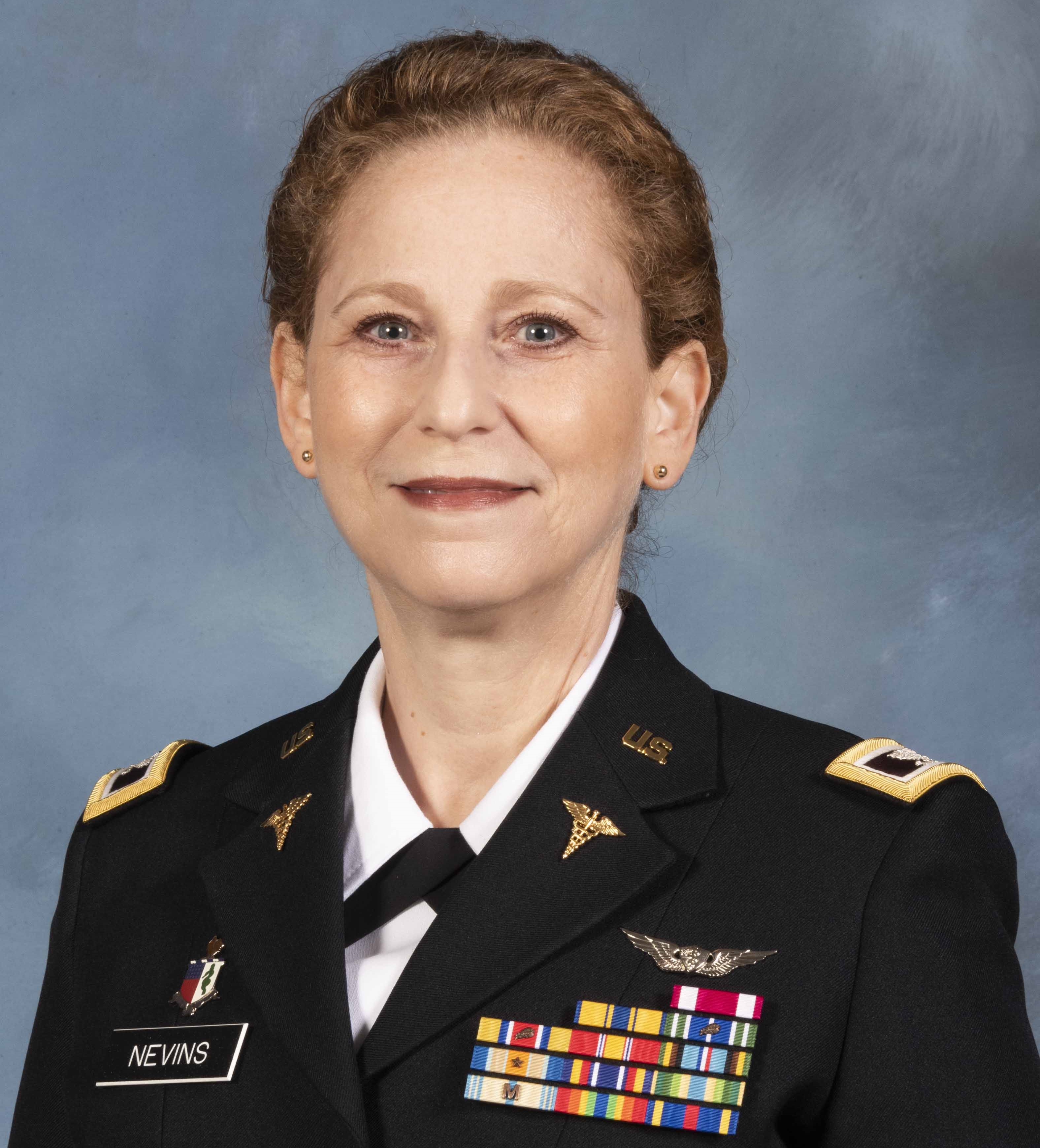Nevins’ Commitment to Women in Medicine Helps to Empower Next Generation
Throughout Dr. Natalie A. Nevins’ career, she has exemplified leadership, perseverance, and a dedication to lifting others

Despite the almost impossibly long list of accomplishments, Dr. Natalie A. Nevins, DO, MSHPE, MSS, FACOFP, FS, and Colonel in the U.S. Army Reserve, almost didn’t go to medical school.
During her undergraduate studies in Interdisciplinary Studies with three areas of major, the dean of her university medical school, a woman, discouraged Nevins from considering a career in orthopedic surgery, telling her, “Oh, honey, that’s really a man’s field.”
Crushed, she applied to law school, got accepted, and almost became a bioethics lawyer. Her gut was telling her she was making a mistake, and when Nevins’ sister-in-law, a Doctor of Osteopathic Medicine (DO), told her that the focus on health and humanism was part of being an osteopathic physician, she changed her plans.
Breaking Barriers and Advocating for Equity
“What brought me to medicine specifically was a passion for caring for people, and especially for those who didn’t necessarily have a voice,” says Nevins.
Since then, she has seen equity for women in medicine improve, yet believes there is more she can do. Nevins encourages all female physicians to unite to help support the next generation of physicians.
Nevins serves as the Associate Dean for Graduate Medical Education Program Development at Touro University California and holds the title of Senior Fellow at the Center for Disaster Medicine at New York Medical College, part of the Touro University System. Her roles are not confined to academia; she also actively works with health profession scholarship students, including military medical students, overseeing the Military Medicine Club and guiding their path toward military residency programs.
A Journey Through Military Medicine
Nevins is also a Colonel in the U.S. Army Reserve, serving as the commander for the Second Medical Training Brigade, and has served in the military for over 23 years. She began active duty in the U.S. Air Force after her medical residency and transitioned to the U.S. Army Reserve in 2014, working everything from command flight surgeon, Chief of Field Response, to family medicine adjunct professor at Uniformed Services University, the All-Branch Military Medical School.
“You must have a passion for the job and the people, because there is nothing worse than getting up every day and doing something you hate,” Nevins says.
Nevins sees medicine as a calling. She says that compassion needs to be in the heart of everyone working in health care to take care of other people, but also remember to take care of oneself. It requires that you put judgment aside to learn about the needs of patients (cultural, religious, environmental) but recognize when your capabilities or energy as a doctor have been exhausted, you need to ask for help.
“You have to recognize that you may be the captain of the ship, but the ship doesn’t run with you alone,” Nevins says of the importance of collaborating with your colleagues. “It’s a team sport.”
Fostering Cultural Competence
Despite the challenges, Nevins’ journey into medicine was driven by her focus on caring for underserved and underrepresented populations. She advocates for a holistic approach treating “mind,ve body, and spirit” and using all tools available – including osteopathic manipulative medicine – to serve patients’ needs.
Recognizing the need for cultural competence in health care, Nevins worked to understand her patients’ cultural and linguistic backgrounds, which she believes profoundly influences their perceptions of health and wellness. Different cultures have different needs, but the definition of culture is expansive, not just defined by upbringing, but by careers like military service.
Nevins notes that military culture is equally unique with its own challenges, particularly for those who serve as health care providers. Medical school can’t adequately prepare students for the realities of working within a theater of war, which include situations for which most civilian doctors are never trained. There is an additional layer of support, training for resilience, hardiness, and additional communication skills for the team, in hopes that the providers don’t get completely broken.
Unique Challenges for Military Medical Personnel
“You go in knowing you may never come back, and that’s not the average thought process of a medical provider who’s working in a hospital or a clinic,” Nevins says. “That means that as medical providers we have to always think about what is it that our individual patients need, with all the things that they bring to the table, not as a military person, and not as any member of any minority group, but as the individuals that they are.”
Nevins explains that for women, the challenges of working as medical personnel in the military can be extra stressful, especially if they are a single parent. Despite the advances for women in the workplace, it’s difficult to not get stuck with the role and responsibilities of being a mother. The burden of guilt of leaving their children for deployment, even with a solid family care plan, is stressful. They often deal with the dual stressors of the military mission and what’s happening back home, that they have no control over.
Nevins exemplifies the dedication, resilience, and compassion required in the field of medicine. Her multifaceted career in academia, military service, and advocacy for holistic health care and cultural competence serves as an inspiring example for aspiring medical professionals.
“As leaders and women in medicine, as far as I’m concerned, it’s our responsibility to uplift the next generation and show them that they will be stronger together,” Nevins says. “When we’re all linked together, we all are uplifted in the process.”
